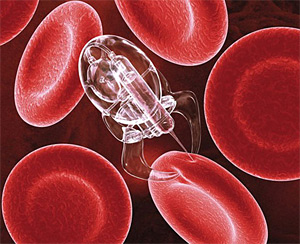
|  |  |  Technology News Technology News  
Peers Criticise Food Industry Secrecy on Nanotechnology
 Rebecca Smithers - Guardian UK Rebecca Smithers - Guardian UK
go to original
January 09, 2010


| | Nanotechnology isn’t just protecting your food – it’s in your food. Scientists are manufacturing nano-sized vitamins that are easier for our bodies to absorb. In the future they hope to create ‘interactive’ food – food and drink that could change color, flavor or nutrients on demand. (nextnature.net) |  |
The UK food industry has come under attack from peers for being secretive over its development of nanotechnology in food and drink.

The Lords science and technology committee is urging the government and research councils to carry out more checks into the use of nanomaterials in food and in particular the dangers for the human body.

Nanotechnology involves whittling common materials down to the size of microscopic particles, allowing them to acquire unusual properties.

Nanoparticles have been used in cosmetics and sun-cream products. They can help create foods which taste the same as conventional alternatives but have lower fat, salt or sugar levels, or enrich foods with supplements, or even be used in packaging to extend products' shelf-life.

Nanotechnology is also being seen as a successor to genetically modified (GM) techniques. This week Professor John Beddington, the government's chief scientist, said GM crops and developments such as nanotechnology must be embraced to avoid catastrophic food shortages and future climate change.

But today's warning from eminent scientists including Lord Krebs – the former chairman of the Food Standards Agency – is the third in two years, after calls from the Royal Society and the Royal Commission on Environmental Pollution for more stringent safety checks.

Research has shown that nanoparticles can penetrate into places larger particles cannot go, such as through the "blood-brain barrier", which stops toxic molecules passing from the blood into the brain. They find their way into vital organs including the kidneys and liver, but precisely what they do in them has yet to be fully investigated.

In a 112-page report, Nanotechnologies and Food, the Lords committee says transparency is key to ensuring public trust in food safety but warns that the food companies' failure to publish details of their research in this area is "unhelpful".

It warns the industry that appearing to be secretive about its research "is the type of behaviour which may bring about the public reaction it is trying to avert".

The report recommends that the Food Standards Agency watchdog should keep a public register of food and food packaging containing nanomaterials.

But Julian Hunt, of the Food and Drink Federation, said: "Given that nanotechnology is in its infancy in the food and drink sector and that bringing new innovations to market is a long and complex process, we are surprised that the report seems to criticise the food industry for an apparent reluctance to communicate extensively on this subject."

Which? chief policy adviser Sue Davies said: "We must fill in the significant gaps in our knowledge about how nanomaterials behave in the human body to ensure that there are no safety concerns in this rapidly developing area."

Peter Melchett, the policy director of the Soil Association, added: "The report is good in drawing attention to the huge risks and uncertainties of nanotechnology. This is a ticking time-bomb."
|

 |
|  |



